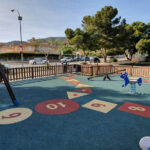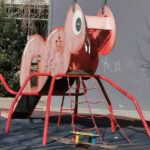
Being curious is a life skill we should all have, and as parents something we must instill into our children. Too often, society teaches us to accept the way things are. We are conditioned later in life to follow the norm. However, the best thing about children is the constant why, why, why? Yes, all children do this and at times it can probably drive you mad as a parent, but curiosity is a key life skill that we as adults should encourage and nourish in our children.
The world is a fascinating place, especially while growing up and discovering everything the universe has to offer, from plants and insects to electronics, to books, to people, to stars and puppets. Everything that is brand new and needs comprehension from a child will naturally create questions for them. Something that as an adult may often seem logical to you, is naturally not so for a child, who may be bursting with endless questions about everything our planet has to offer. Hence, the question “why?” is a word that in language, you as a parent will frequently hear.
We find this brilliant. The more curious you are as a child, the more adventurous your life may become. Taking this key life skill into your teenage and adults years will open up many doors because you are not bound by the limitations set through the mold you are raised in but are willing to question things. Therefore, as a parent, encourage your child’s curiosity.
Here are a few cool ideas that will help you do so.
1. Read, read, read.
Reading is crucial to a child’s development. Whether you read to them out loud from a young age, or together teach them how to pronounce words so that they can begin reading on their own, reading is all about curiosity and imagination. Reading also creates a strong bond between you as a parent and your child.
On top of this, reading does not even have to be expensive. There is no need to purchase numerous books. You can browse through a bookstore along with your children and see where their curiosity leads them. Alternatively, a public library is also a great, and often a cheap alternative. Children can browse around, and you can begin seeing what they like to look at.
Spend some time reading and together with your child dive into an imagination wonderland. If you need help, ask a bookseller or librarian for help.
2. Listen to your child’s questions
As a working adult, you may tend to brush off certain things for the “rush” of daily life, however, regardless of how strange a question may be or perhaps even difficult to answer, taking the time and effort to really look at your child and answer their question, will make them feel like their curiosity is valuable and important.
Some questions, you may not even know the answer to, and it is okay to say so. Being honest with your child teaches them another trait. The best thing is to then find out the answer together, and thanks to the internet this is now easier than ever. Doing this together with your child, showing them what to do, and how to do it, will teach them to find answers and to do their research. As a parent, showing your child that their curiosity matters, even when you don’t know the answer, gives them confidence that it is okay to not know, but to learn how to know.
Keep in mind, that when children are small, you are their source of information, aside from maybe teachers or friends, and we as parents should be the place they can go to and ask anything. Furthermore, they should have the confidence that any curiosity will be answered and not just brushed off. There listen carefully!
3. Talk with others
We can all learn so much more from the dialogue. You can learn many things from others, whether your neighbors, the mailman, teachers or friends, or even random acquaintances when traveling somewhere new. Encourage your child to ask people about them and their lives and things they love (within certain scenarios), Children will discover how others live their lives in other communities, backgrounds, and parts of the world, and hence, the world will become just that much more interesting as they learn new things on these adventures.
4. Slow it all down
In the hustle and bustle of day-to-day life, rushing between kindergarten, work, after-school activities, shopping, groceries, dinner, etc., we tend to forget that the hectic comes from within, from us. We created it. Often we all, as adults, need to slow it all down.
This is an extraordinary trait within children, who if you watch closely will be “with or around” something as if in slow motion. They may sit in front of the washing machine for a period, or bend down and watch a worm for minutes on end, and as a parent, we think “why?” however that is exactly the point. Being here at the moment. If you can learn to slow things down and connect with your child about the things they are interested in through taking moments and talking with them during those extraordinary, but ordinary moments, you’ll encourage their curious nature.
Tell them things about nature when going for a walk, like the names of flowers, try a variety of different fruits together and talk about their flavors, sit down with your child no matter how young, and talk about feelings. You’ll be amazed that when you learn to slow life down, you too will discover the magic of everyday life (again), something that we as adults in an ever-on world tend to forget.
William Martin, an accomplished author, puts it best:
“Do not ask your children to strive for extraordinary lives.
Such striving may seem admirable, but it is the way of foolishness.
Help them instead to find the wonder and the marvel of an ordinary life.
Show them the joy of tasting tomatoes, apples and pears.
Show them how to cry when pets and people die.
Show them the infinite pleasure in the touch of a hand.
And make the ordinary come alive for them.
The extraordinary will take care of itself.”

5. Let your child guide you
We as parents believe it is our responsibility to always guide our children. To ensure they are on the right path, on the right track, doing the right things, however, at times learn to follow your child’s curiosity.
Try to keep things playful, try new foods, go see new things, encourage them to try things and see what they are naturally interested in. Once you begin noticing the things they like doing, then you can begin guiding them. The ideas here are abundant – from petting zoos to parks to observatories to a few hours at a playground to laying there and looking at clouds together. Taking the time to follow your child’s curiosity and discover, through their interests, the questions they have about life and things, in general, will give you, as a parent, the feel of where you can support them. What their natural instincts and talents are and what things you might do to give them a push in.
The future is an ever-changing one and teaching your kids to be flexible, open-minded, imaginative, and innovative will help them engage, through curiosity, into a job, whatever that may be, by being able to think laterally and delve more deeply into useful skills they can develop from an early age.
6. Downtime is important
Do, do, do. Parenting styles are all different. However, when it comes to curiosity, let them play, think and daydream and find what they like to do. Give them the options, from wearing clothes to drawing, to what they would like to spend time doing. However, while doing all this, keep in mind, that they too should relax their minds, in order for curiosity to grow. By at times, letting them do what they would like to do, from walking barefoot in nature to watching leaves fall, allows them to experience “wonder”.
Allow them to be themselves because remember it is curiosity that has caused everything as we know it. It was because someone said, “What would happen if I went there?” or What would happen if I did this?” or “what if I asked this question?” – teaching your child and instilling them with curiosity is a gift that will allow them to live a rich and fulfilled life in a society filled with norms.









